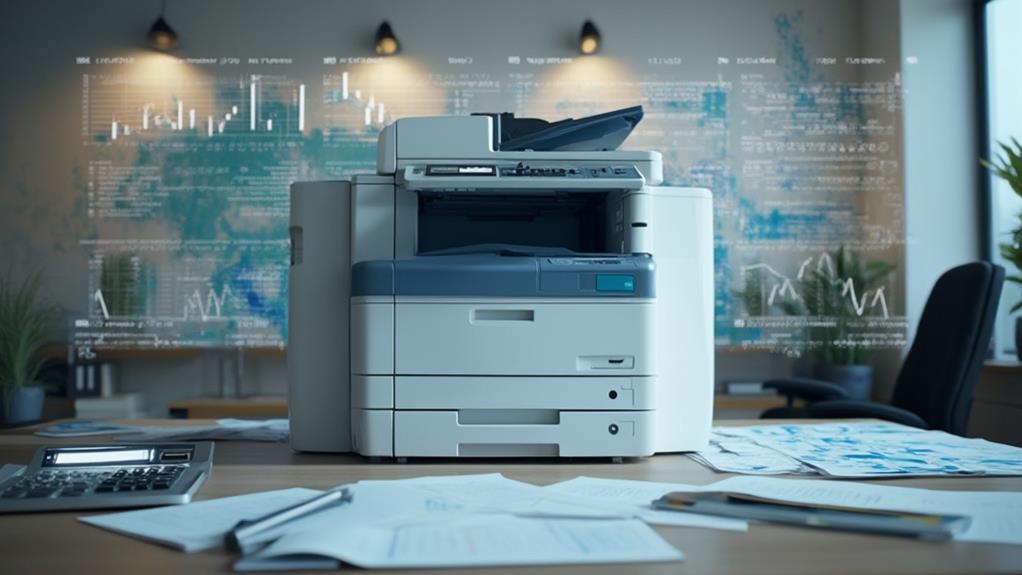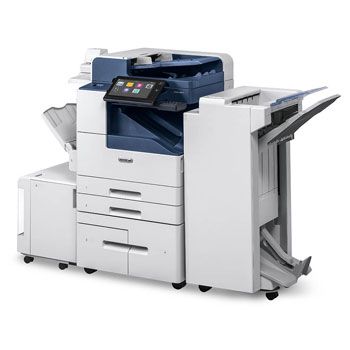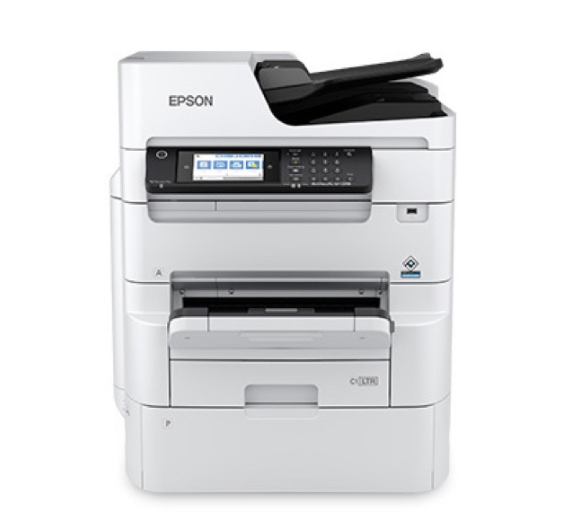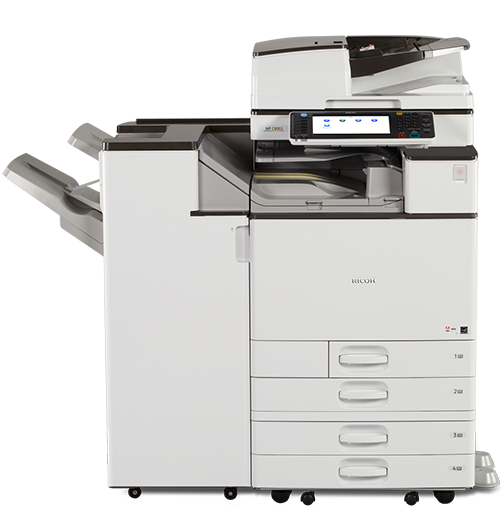A copier lease is considered a capital lease if it aligns with specific accounting standards, such as IFRS or GAAP, which outline criteria based on ownership transfer and payment terms. To qualify, a lease must involve the transfer of ownership, a bargain purchase option, or cover a substantial portion of the asset's useful life. This classification dramatically shifts financial statements, recording the leased copier as both an asset and liability. The implications are profound, affecting leverage ratios and return on assets. Understanding these factors is crucial for making informed decisions on copier leases and more can be uncovered by exploring further.
MF Printer Lease Highlights
- A copier lease may be considered a capital lease if it meets specific criteria outlined by accounting standards like IFRS or GAAP.
- Key criteria include transfer of ownership, bargain purchase option, or a lease term covering the majority of the asset's useful life.
- If classified as a capital lease, the copier must be recorded as an asset and liability on the balance sheet.
- Capital lease classification affects financial ratios, such as leverage ratios and return on assets.
- Leasing experts can help evaluate whether a copier lease meets capital lease criteria for informed financial decision-making.
Definition of Capital Lease
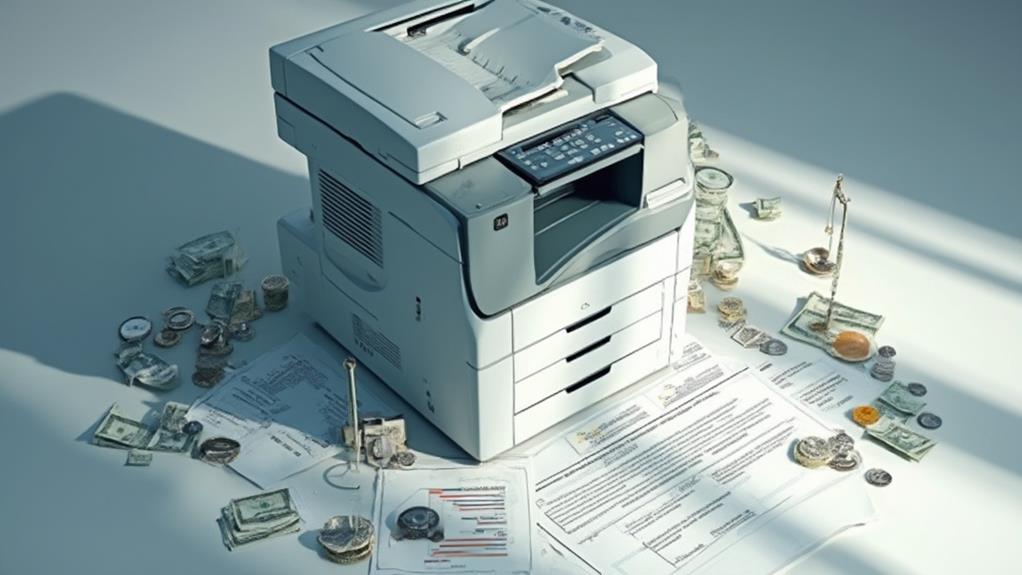
A capital lease, also known as a finance lease, fundamentally transforms the way a leased asset is viewed on a company's balance sheet by aligning it with ownership principles. For businesses considering the lease, rentals office equipment, it is crucial to understand the important financial implications of classifying a lease as a capital lease.
To classify a lease as a capital lease, specific criteria must be met, such as the transfer of ownership at the end of the lease term, the option to purchase at a bargain price, or the lease spanning the majority of the asset's useful life. Such classification drastically impacts financial statements, requiring the leased asset and associated liabilities to be recorded, thereby affecting both the company's asset base and liability structure.
Criteria for Capital Lease
To determine whether a copier lease qualifies as a capital lease, it is essential to evaluate it against specific criteria established by accounting standards. Capital leases, now commonly referred to as finance leases under current accounting guidance, are treated similarly to asset purchases. These criteria, outlined by standards such as the International Financial Reporting Standards (IFRS) and Generally Accepted Accounting Principles (GAAP), help entities make informed leasing decisions that reflect financial realities.
One key criterion is the transfer of ownership, where the lease agreement specifies that ownership of the copier is transferred to the lessee at the end of the lease term. Another important criterion is the presence of a bargain purchase option, which allows the lessee to purchase the asset at a price noticeably lower than its fair market value upon lease termination. Additionally, the lease term itself should cover a major portion of the copier's useful life, usually around 75% or more.
Furthermore, the present value of the minimum lease payments should equal or exceed substantially the fair value of the leased asset, often around 90% or higher. By meeting these criteria, a copier lease aligns with a capital lease classification.
Lease Classification Factors
Understanding the criteria for capital leases underscores the importance of accurately classifying leases to reflect their true financial implications. Lease classification factors are essential for determining whether a lease is a capital lease, dictating its representation on financial statements.
Capital leases, often referred to as finance leases, fundamentally transfer ownership risks and rewards to the lessee. The classification depends on several conditions, each of which reflects a deep financial commitment akin to asset ownership.
Primarily, one must consider if the lease term covers a substantial portion of the asset's useful life. If the lease term is 75% or more of the asset's economic lifespan, it hints at capital lease classification. Additionally, if the lessee has the option to purchase the asset at a bargain price upon the lease's conclusion, it is often categorized as a capital lease. Another factor is whether the present value of lease payments amounts to at least 90% of the asset's fair market value.
These factors mandate leases are evaluated with precision, emphasizing their economic realities rather than just their legal form. Proper classification fosters consistency and transparency, allowing all stakeholders a clearer understanding of a business's financial commitments.
Balance Sheet Impact
Capital leases substantially influence a company's balance sheet by introducing both an asset and a corresponding liability. These leases require lessees to acknowledge the leased equipment as an asset, while simultaneously recording a liability for future lease payments. This recognition transforms the financial statements, offering a more detailed picture of the organization's fiscal commitments.
The asset is typically recorded at the present value of future lease payments or the fair value of the asset, whichever is lower. This dual entry highlights the firm's ongoing financial obligations and resource ownership.
For many companies, especially those aiming for transparency and strategic asset management, this balance sheet impact is significant. It enhances a company's leverage ratios, as the liabilities from the capital lease elevate the total debt obligations, demanding careful consideration. In addition, it affects the return on assets ratio, given the inclusion of leased items as assets, prompting businesses to reconsider their asset management strategies.
In a community of business professionals who value detailed financial insights, understanding these implications fosters informed decision-making. Such knowledge aligns shared goals, such as cultivating transparency and aligning long-term financial planning with asset acquisition strategies. Through this clarity, firms better navigate the complexities of accounting standards, fostering a sense of competence and solidarity.
Reliable Office Equipment Solutions for Your Business
At Reliable Office Equipment Solutions, we specialize in providing tailored leasing solutions for businesses seeking efficient and cost-effective office equipment, including copiers and printers. Our team understands the importance of accessing the latest technology without the significant upfront investment. By offering flexible leasing agreements, we help businesses manage their operational expenses while guaranteeing they have access to high-quality, reliable equipment that boosts productivity.
Copiers and printers are essential tools for business efficiency, and our services include extensive maintenance and support. This ensures that your equipment remains in superior condition, minimizing downtime, and maximizing your business's efficiency.
Following Google's best practices for customer service and equipment management, we prioritize transparent communication, quick response times, and a customized approach to meet the unique needs of each client. Whether you're a small start-up or a large corporation, Reliable Office Equipment Solutions is committed to empowering your business with the right tools for success.
Benefits

Understanding the benefits of a capital lease for office copiers can greatly impact a business's financial strategy, offering advantages such as efficient cost management and tax benefits. New advancements in copiers and printers have amplified these benefits, allowing businesses to adopt more versatile equipment that enhances productivity.
Cost Management Strategies
Implementing effective cost management strategies offers multiple benefits to organizations considering copier lease agreements. By adopting structured financial planning, companies can better anticipate expenses and allocate resources efficiently. This approach helps in predicting both fixed and variable costs associated with leasing, which aids in maintaining steady cash flow. A copier lease often involves predictable payment schemes, allowing businesses to budget more effectively without the surprise of unforeseen expenditures.
Additionally, leasing agreements often include maintenance and service arrangements, reducing the burden of unexpected repair costs. This integrated service supports organizations in managing their operational costs extensively. Being mindful of these strategies fosters a sense of community, as organizations collectively engage in prudent financial practices that guarantee long-term sustainability.
Furthermore, embracing well-planned cost strategies enhances an organization's financial stability. It instills confidence among stakeholders by demonstrating a commitment to financial responsibility. By focusing on cost-effective solutions, companies can reallocate savings towards innovation and growth, thereby boosting their competitive edge.
Tax Advantages Overview
Leasing a copier can offer substantial tax advantages that benefit organizations by reducing overall taxable income. When a copier lease is classified as an operating lease, the monthly lease payments are considered operational expenses. This allows businesses to deduct the entire lease payment amount every year it's incurred, thereby lowering the taxable income. For many businesses, particularly those aiming for efficient financial management, this deduction can provide significant annual savings, helping maintain a healthier financial position.
Another compelling advantage of copier leasing is the potential to conserve cash flow. Instead of a substantial upfront purchase expense, leasing disperses costs evenly over time, which is especially beneficial for small to medium-sized enterprises (SMEs). This steady outlay aligns perfectly with predictable monthly budgeting, enhancing financial planning without sacrificing essential technology needs. When coupled with potential tax deductions, leasing becomes an appealing option for companies seeking to optimize cash reserves.
Moreover, leasing agreements often come bundled with service plans, ensuring maintenance and repair costs are part of the operational budget. This element further maximizes tax advantages, as it integrates seamlessly into operational expenses, reinforcing financial sustainability. Such all-encompassing strategies contribute to a sense of stability and belonging within the organizational ecosystem.
Flexible Upgrade Options
A key advantage of copier leasing is the flexibility it offers with regards to upgrading technology. In a rapidly evolving digital landscape, staying current with the latest technology is paramount for businesses striving to maintain a competitive edge and operational efficiency.
Leasing agreements often provide terms that allow for technology upgrades, ensuring that organizations can benefit from the latest advancements without the prohibitive cost of outright purchasing new equipment every few years. This ability to adapt swiftly to technological advancements is not only efficient but also cost-effective.
For businesses, this translates into the opportunity to consistently utilize cutting-edge technology that can enhance productivity and cater to evolving business needs. It also negates the concern of technological obsolescence, which can otherwise lead to decreased performance and higher repair costs. In addition, these flexible upgrade options often come with straightforward terms that are easy to navigate, thereby simplifying the decision-making process for businesses.
For organizations that value community and teamwork, having access to the latest technologies can be a crucial part of creating an inclusive atmosphere where everyone is equipped to perform at their best. Flexible upgrade options support this ideal by ensuring that all team members work with exceptional resources.
Predictable Budget Planning
In addition to the flexibility of technology upgrades, copier leasing provides a significant advantage with respect to predictable budget planning. Leasing allows for predetermined monthly payments, enabling businesses to forecast expenses with certainty. This systematic payment schedule mitigates unexpected financial fluctuations, offering a sense of financial stability which is invaluable for any organization aiming for longevity and growth.
The benefits of predictable budget planning through copier leasing include:
- Steady Cash Flow Management: Monthly leasing payments guarantee continued operational liquidity.
- Expense Forecasting: Helps in planning future budgets with tangible figures, consequently avoiding surprise expenses.
- Cost Distribution: Distributes costs over time, reducing the initial financial burden often associated with direct purchases.
- Financial Stability: Stabilizes expenses, which allows businesses to focus on strategic goals rather than erratic costs.
- Adaptable Spending Plans: Adjusts easily to evolving financial scenarios without disrupting budgetary constraints.
These factors collectively contribute to a financial ecosystem where businesses can operate with confidence and security. Such predictable expenditure patterns are especially beneficial for companies seeking consistency and strategic alignment in their financial practices. Therefore, copier leasing emerges as not only a practical choice but also a strategic financial decision.
Trusted Copier Leasing Experts
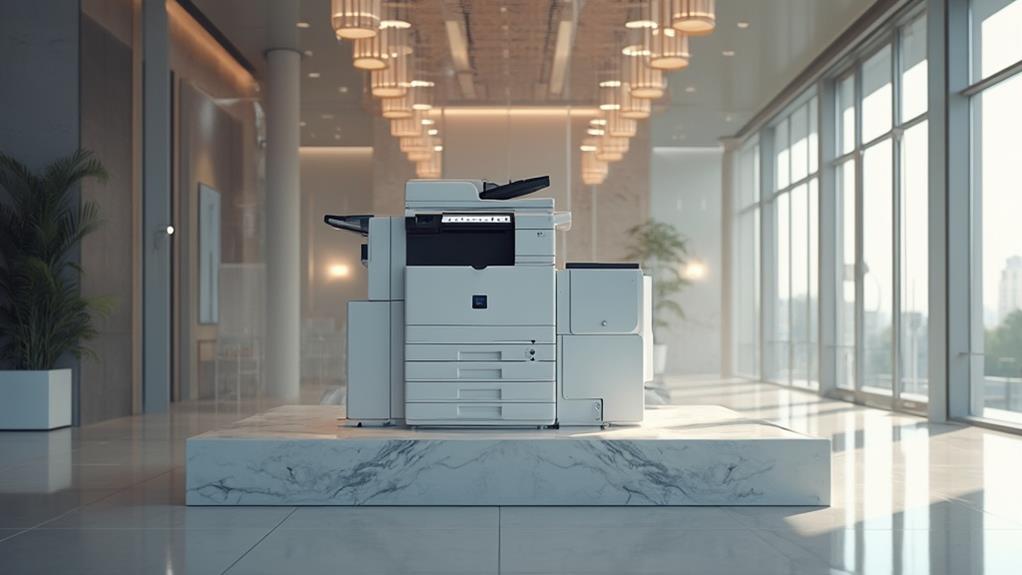
Engaging trusted copier leasing experts can extensively enhance your understanding of key financial decisions by providing industry insights, expert contract guidance, and thorough long-term cost analyses. These professionals allow businesses to approach leasing with a strategic outlook, balancing short-term needs with future financial impacts. For clarity, consider the following aspects of their expertise:
| Aspect | Description |
|---|---|
| Leasing Industry Insights | Updates and trends in the copier leasing market. |
| Expert Contract Guidance | Detailed analysis of contract terms and conditions. |
| Long-Term Cost Analysis | Evaluation of financial implications over time. |
| Strategic Planning | Alignment with business objectives and budgets. |
| Decision Support | Assistance in making informed leasing choices. |
Leasing Industry Insights
Expert opinions in the leasing industry can greatly influence businesses traversing the complex world of copier leases. In an ever-evolving market landscape, these insights are invaluable, providing transparency and aiding in sound decision-making.
Industry experts emphasize the importance of understanding the dynamic nature of leasing, which directly influences the financial and operational aspects of a business. Their perspectives offer depth to the discussion of whether a copier lease should be classified as a capital lease, highlighting subtle yet critical details that businesses might overlook.
Industry insights regularly focus on several key areas:
- Market Trends: Understanding current and anticipated changes in copier leasing.
- Technological Advances: How new copier technologies affect leasing decisions.
- Financial Impact: Evaluating the long-term cost implications of a lease.
- Strategic Fit: Aligning lease agreements with company objectives.
- Regulatory Compliance: Handling and adhering to financial reporting standards.
These elements serve as a foundation for businesses wanting to remain competitive and informed. By engaging with industry insights, organizations can foster a sense of belonging within a well-informed community, each member empowered to make strategic financial decisions. This collective knowledge actively shapes the pathways for ideal lease management and business growth.
Expert Contract Guidance
Trusted expertise in copier leasing contracts offers businesses robust guidance essential for maneuvering the intricacies of lease agreements. Traversing these complexities requires a profound understanding of financial and operational elements that impact organizations. Trusted experts bring clarity, ensuring businesses secure agreements tailored to their unique needs. They meticulously analyze terms to distinguish between capital and operating leases, explaining nuanced details vital for informed decision-making. By engaging these professionals, organizations receive unparalleled insights, fostering confidence and competence in choosing the ideal leasing arrangement.
Furthermore, a trusted copier leasing expert serves as a critical ally in safeguarding a company's interests. They emphasize the importance of evaluating all contractual terms, from potential hidden fees to details about equipment maintenance responsibilities. This approach ensures that businesses not only mitigate risks but also optimize their operational efficiency. Clear communication from these experts aids in demystifying complex financial language and aligns company strategy with fiscal reality.
Engagement with such experts also cultivates a sense of community and partnership, crucial for businesses seeking collaboration. They promote an environment where informed choices become a collective achievement, reinforcing the relationship between businesses and their advisors, grounded in shared goals and mutual understanding.
Long-Term Cost Analysis
Conducting a long-term cost analysis is pivotal when evaluating copier leasing options, as it provides a detailed overview of the financial implications involved. This analytical approach aids organizations in making informed decisions, ensuring they align with budgetary objectives and operational needs. It emphasizes considering not just the immediate expenses such as monthly lease payments but also the longevity and utility of the equipment throughout the lease term. It is especially relevant for businesses where minimizing operational costs and maximizing resources is critical.
By engaging in detailed analysis, businesses can gain insights into several components:
- Lease Duration: Examining the long-run financial commitments and opportunities linked to lease periods.
- Total cost of ownership: Understanding the cumulative expenses, including maintenance and potential upgrades.
- Depreciation versus Value: Evaluating how depreciation affects the asset's value against its leasing cost.
- Ending Options: Considering trade-up opportunities or technology refresh options at the term's end.
- Cash Flow Impact: Estimating how lease payments align with overall cash flow management strategies.
These factors not only affect the bottom line but also contribute to strategic planning, reinforcing the sense of stability and belonging within the organization. This fosters informed decision-making for sustainable growth.
Connect With A Team Member Today!
If you're trying to determine whether a copier lease qualifies as a capital lease or have any other questions regarding office equipment leasing, our team is here to assist you. Connect with one of our knowledgeable team members today to get personalized advice and solutions tailored to your business needs.
Interested in getting in touch? Don't wait—gain the clarity you need to make informed decisions. Call us now at (888) 331-7417. We are enthusiastic to help you navigate your copier lease options!

